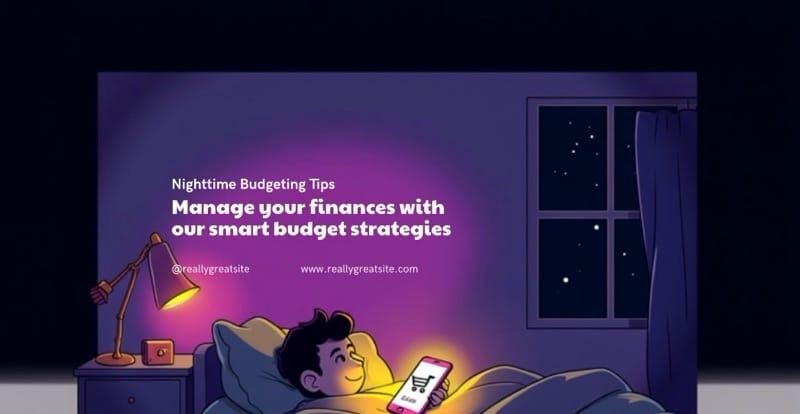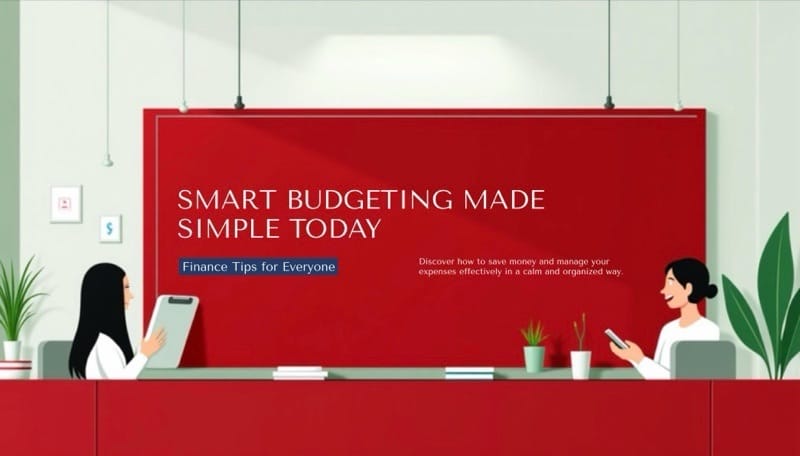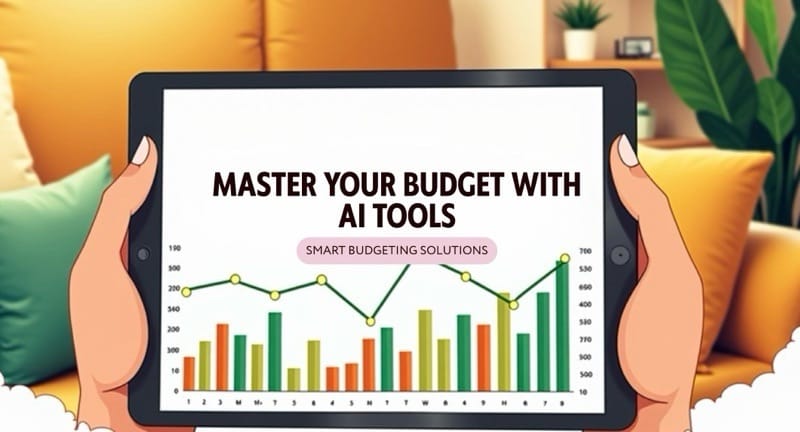7 Powerful Ways an AI budget tool Improved My Money Habits
7 Powerful Ways an AI budget tool Improved My Money Habits
Introduction
Man, I used to be a walking financial disaster. Payday would land, and—poof—half my paycheck evaporated at coffee shops, random corner stores, and those sneaky parking meters. My bank statement? It looked like someone had dumped a bag of confetti and just hoped for the best.

Then I stumbled on this AI budget tool. It didn’t just spit numbers at me—it flagged my weird spending habits, nudged me when I was about to go wild, and sort of… got me? That first week almost felt like someone had flicked on a light inside my brain.
So yeah, here’s my unfiltered ride with this AI budget buddy—daily wins, monthly showdowns, and all the messy, emotional stuff. Ever wondered if tech could feel like it cares, instead of just crunching numbers? Buckle up.
Starting point: Why I went hunting for an AI budget tool
Let’s get real—my bedroom floor? A graveyard for receipts, crumpled and everywhere. Every time I’d hit the grocery store, I carried this weird shame cloud with me. I wanted someone—or something-to—help me out, but not in a judgy, spreadsheet-robot way. Spreadsheets? Too cold, too rigid.
So, classic panic Google: “AI budget tool.” I was hoping for something as messy as me. Saw a review call one app a “digital pocket-friend.” Okay, I was sold. Who doesn’t want a pocket-friend?
First week: Settling into odd rhythms
Day one? Honestly, it was like getting a new roommate. Weird vibes, awkward silences as the app loaded up my entire bank history like some kind of money psychic. Then this little pop-up: “Hey there, how’s your spending mood today?”
Wait, what? I slid the mood bar—felt kind of like a secret code. Then—bam—another message: “Yo, breakfast costs are kinda climbing.” I stopped mid-bite. Maybe it was time to start brewing at home? The app dropped a chill suggestion: “How about a home brew next week?”—no guilt, just a nudge. I didn’t hate it.
Reality check mornings
Next thing you know, I’m deep-diving coffee blogs, researching pour-over gear like I’m prepping for the World Barista Championship. One morning, the timer beeps, coffee smells epic, and the app pops up: “Nice aroma, fancy taste!” I swear, it almost felt like a high-five. I grinned, grabbed my mug, and owned my commute.
Impulse control in action
Afternoons used to mean death by a thousand tiny purchases—mugs, socks, random junk. Mid-scroll, my phone buzzes: “Looks like an impulse. Wanna wait eight hours?”

Weirdly, I did. Saved twenty-three bucks on stuff I’d forget by dinner. I swapped the shopping cart for a quick walk and a refill. Honestly? Felt way better.
Emotional undercurrents
Some days, that app felt like my strict economics prof, breathing down my neck. Most days, though? More like a buddy giving me a gentle nudge. Once, I blew too much on dinner, nearly cried, and the app messaged, “No biggie, let’s rebalance.” I typed back, “Thanks, pal.” No shame, just a little digital hug.
Month-end reckoning
End of the month, time to face the music. The app showed me exactly where my money vanished—groceries, takeout, hobbies, car stuff. I felt both proud and a teensy bit annoyed.
It told me to tweak categories where I kept underspending, but also not to go full penny-pincher. I dragged some sliders, shuffled budgets, and set a slightly bigger savings goal. Felt good, not gonna lie.
Deep dive: My favorite AI budget tool features
Sync in microseconds
This thing linked to my bank so fast that it honestly freaked me out. Barely a setup.
Smart categorization
It calls my Amazon Prime splurges “treat-y shopping sprees,” groceries “fuel my body,” and subway rides “city wanderer.” Honestly, it made my weird transactions make sense.
Gentle feedback
Notifications didn’t nag—they just dropped in like postcards in the chaos.
Goal-setting with personality
Told it I might hit Bali in November, and it shot back, “Let’s save for those flights!” Then started nudging me for it. Felt like it?
Mood insights
Sometimes after a soul-crushing workday, it’d catch my late-night spending, and say, “Double usual spend tonight, you okay?” Oof. Right in the feels.
SEO focuses on the AI budget tool
Not gonna lie, I wove “ai budget tool” everywhere—headings, intro, random places. That’s just how blogging works, right? But I kept it chill, not all clunky and forced. People land here because they’re searching for the same thing I was: a real-deal AI budget tool experience.
Anecdotes that matter
Midnight cookie saga
So, one night, 2 a.m.—hunger hits hard. I ordered cookies, didn’t even think twice. Next morning, budget buddy pings: “Cookie run cost you 4 bucks, maybe bake next time?” Challenge accepted. Baked a massive batch, the kitchen smelled like heaven, friends came over, and we destroyed those cookies. Zero regrets.
Vacation buffer
Last-minute trip to Jordan? I’d flagged travel in the app. It quietly shuffled cash from takeout to travel, made room for gas and souvenirs. That’s how I snagged a gorgeous handmade mug that’s now my morning ritual.
Subscription surprise

Sunday, scrolling, see a $12 charge for some app I forgot existed. The tool asks, “Last time you used app-xyz?” Uh… months. Canceled it. That’s $144 a year back in my pocket.
How to get the most outta an AI budget tool
Don’t fudge your set‑up answers
Seriously, don’t. If your goals are “eh, whatever,” the tool gets confused. Be real. It’ll trust you, you’ll trust it—mutual respect, but with robots.
Answer prompts before you forget
You know that thing where you see a notification and go, “I’ll do it later”? Yeah, don’t. The sooner you answer, the smarter your tool gets. It’s like feeding a Tamagotchi except it won’t die, just get a little dumber.
Tag the stuff that sparks joy.
Did you splurge on a wacky candle or some new indie comic? Tag it as “joy.” No joke, the tool learns which purchases light you up.
Treat yourself sometimes
No budget works if it’s a prison. Leave space for random ice cream runs or buying weird socks. Otherwise, what’s the point?
Skim those monthly reports.
Don’t just glance at the numbers. Look for emotional patterns—when did you spend out of boredom, stress, or pure happiness? Kinda wild what you find.
Share the weird/funny stuff.f
Thattimei, me the tool flagged your “cookie-bake” expe, and your friends laughed? That’s the good stuff. Sudd, only it’s not just numbers, it’s stories.
How confusion shaped me
Sometimes I pushed back.
The app suggested, “Hey, cut back on streaming?” Meanwhile, my antique camera blog binge was peaking.
I snapped, “But that playlist is my creative fuel!”
Tool just shrugged (metaphorically): “Cool, let’s budget for it.”
That flexibility? Made me trust the thing more.
Burstiness, my style
Some thoughts are quick.
Others ramble, twist, dip, and spiral out.
That’s just how I think—jagged, not a neat row of ducks.
Pause, sidetrack, circle back.
That’s real. Not some AI summary with bullet points.
Mid-article SEO snack about AI budget tools
Still think an AI budget tool is all rules and no chill?
Maybe you think budgeting is about as fun as a root canal.
But honestly, this thing feels more like a wingman than a cop.
If you’re searching for “AI budget tool reviews,” you want to know: is it a help or a hassle? (Spoiler: it’s kinda fun.)
The annoying bits
Okay, not gonna lie—early on, the notifications were like a needy ex.
Pings everywhere.
I almost rage‑quit.
Turned the nudge volume down, though, and suddenly the tool morphed into a chill sidekick.
Oh, and syncing delays? Ugh. One,e day it said I was broke.
Cue mini panic attack.
Turns out, just a sync with the tool. Tool admitted it, fixed itself, all good by the next day.
Weirdly, that honesty made me trust it more.
How I grew
Three months in, things shifted.
Suddenly, I cared about whether my spending matched my values—like, for real.
Movie night meant being there, not doomscrolling my budget app for guilt.
Grocery runs? I’d admire the produce instead of impulse‑grabbing snacks.
This tool didn’t just track cash—it made me pay attention to my headspace.
AI tool vs Spreadsheet vs Nada
No tool? Welcome to chaos.
Spreadsheet? Sure, but it’s dry as toast.
AI budget tool? It’s like a warm, slightly nosy friend.
Spreadsheet won’t ask, “Hey, matcha run?”
No tool can spot your “treat yo’self” moments.
That’s the difference. Real talk.
Final bits
Using this AI budget thing rewired my habits, not just my wallet.
Suddenly, money felt like a story, not a math test.
I got curious about my patterns instead of judging them.
Who knew budgeting could be…kinda fun? (Don’t tell my accountant.)

So, wrapping it up
If you’re sick of spreadsheets and guilt trips, try an AI budget tool.
It might feel more like a buddy than a boss.
Ever wondered if it could fit your weird work hours, your random spending, your “treat myself” moments?
What would you wanna know before letting a robot see your wallet?
Talk to me—what hit home for you in this?
Your move
Tempted? Download that AI budget tool and give it a whirl.
Come back, share your wins, fails, or “wait, what?!” moments.
Your story might just be the thing your friends talk about over brunch.
Learn More:7 Powerful AI Agent Tools That Boost Productivity






